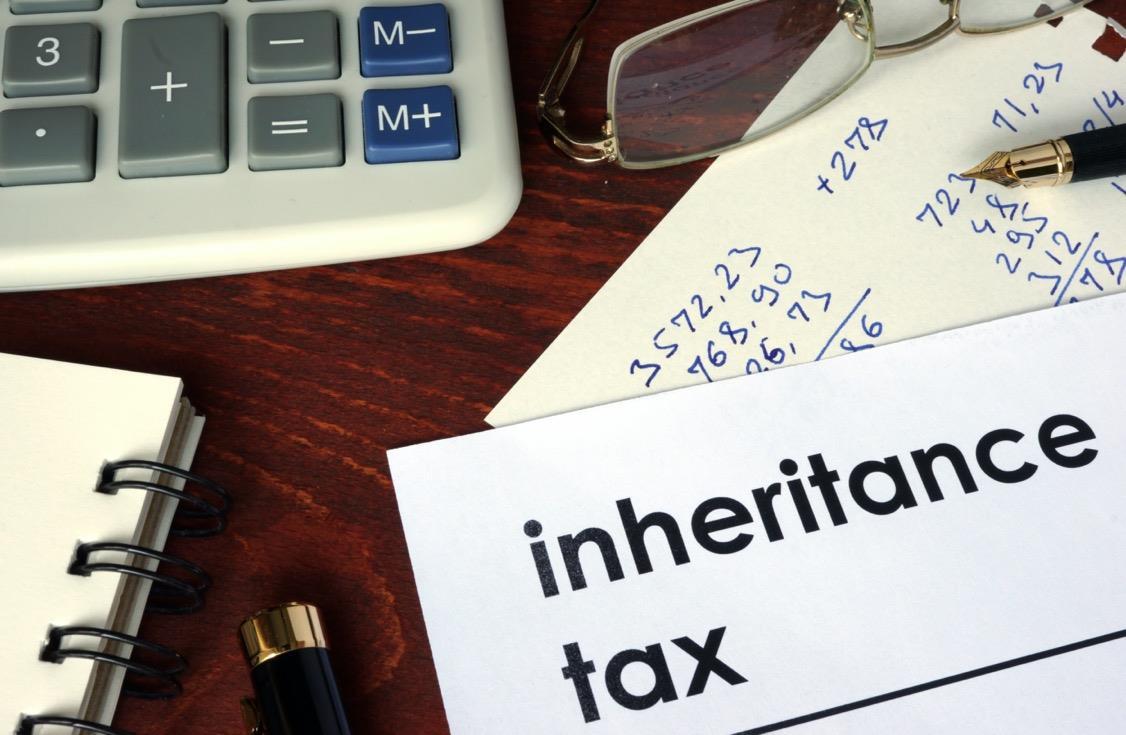You’ve
left


MoneyMagpie
been
Tower Street Finance &
– what now? present: an inheritance
Contents
• Introduction
• The Difference Between a Beneficiary and an Executor
• What is Probate?
• The Taxing Issue of Paying Inheritance Tax

• Covering Costs Before Probate is Granted
• Inheriting Property
• About Tower Street Finance

1. Introduction
So, your loved one has died. Now what?

Navigating the issues of inheritance and probate can be confusing – and it happens at the most stressful time of our lives, too. That’s why we’ve partnered with inheritance lending specialist Tower Street Finance to bring you this easy guide, designed to help you understand the financial issues when someone close to you dies.
We’ll cover:
• The difference between executors and beneficiaries (and who does what)
• Explain what probate is and how long it can take

• If you’re an executor, how to pay an inheritance tax bill
• What happens when you inherit a property
• Who is responsible for the debts of the deceased
• What happens when someone dies without a will
• And much more!
Tower Street Finance offers products that make it easier for people to access their inheritance. Its award-winning Inheritance Advance product enables beneficiaries to access to up to 60 per cent of an inheritance before probate has been granted, while its Inheritance Tax Loan has been designed to allow Tower Street Finance to pay any tax liabilities to HRMC directly so an estate can be released earlier. Neither product carries any personal liability for the executor/beneficiary as they are repaid by the estate.


2. The Difference Between a Beneficiary and an Executor


When a loved one dies, you’ll often hear two words when people talk about the will: a beneficiary and an executor.
A Beneficiary
This is someone who will benefit from the will. They might be listed to receive cash, a specific item, property, or a specific proportion of the deceased’s estate.
An Executor
This is the person who manages the estate and distribution of proceeds (called ‘administration of the estate’) as set out in the deceased’s will. If you’re an executor that means you can make executive decisions about things like selling inherited property, talking with banks and utility suppliers on behalf of the deceased, settling the debts of the deceased, and (of course) applying for probate. An executor is commonly also a beneficiary, but a beneficiary won’t always be an executor.
You may also hear about a witness. This is somebody who signed the will as a witness when it was made. The rules mean you can’t be a witness to a will if you are going to benefit from it in any way. If the person who signed as a witness is also listed as a beneficiary in a home-made will, this could cause some legal complications and it is best to speak to a solicitor as soon as possible.
What if there is no will?
Dying without a will is surprisingly common. In fact, around a third of people in the UK die without one. Many people assume their assets will automatically pass to their children and therefore they don’t think a will is necessary, or they have died prematurely and did not get around to writing one.
The first thing to do if you suspect that there is no will, is to double-check. Before you do anything else, check all the paperwork in their home. You might need to get creative with thinking about hiding places for one, too! (We’ve heard of one hidden between the fabric and frame of a sofa!).
Often, people made a will many years ago and stored it with a solicitor. If you have no luck when searching the house, try to find information in their paperwork to see if they had used a solicitor at any point. Contact the solicitor to see if a will has been stored with them.
Sometimes, a bank will look after important documents, too. Check with their bank to see if the will was stored there.
If all else fails, you can ask a specialist company to find the will. You could also try the National Will Register to find evidence of a will (particularly helpful if, for example, the solicitor listed doesn’t exist anymore).

Still no will?
If all the above fails, it’s likely that the person has died intestate. That means they died without a will. There are special rules that apply when this happens. We explore this more in the next chapter, but here is a summary.
The most significant thing is that only immediate spouses or civil partners, or close relatives, can inherit.
Friends of the family will not be able to benefit, nor will partners who co-habit (are not legally married or in a civil partnership), no matter how long they have lived together.
If someone dies and their spouse or civil partner is still alive, they will inherit the first portion of the estate, plus all belongings and personal property. They receive the first £270,000 of the estate, plus half of the remaining estate. So, for example, if the estate was valued at £600,000, they would get the first £270,000 which leaves £330,000 left in the estate. Half of that (£165,000) also goes to the spouse/civil partner, so the total amount received by them is £435,000.
The remainder (the other £165,000) is divided equally among surviving children. If the children are no longer alive, but there are grandchildren, the remainder is divided among the grandchildren.
If the deceased does not have a surviving partner, the estate is inherited equally between all surviving children.
In some cases, other family members may be able to inherit if a person dies intestate. This usually happens when the person did not have a spouse or civil partner, or children. Citizens Advice has a useful guide to intestacy rules on their website here.
It’s important to note that someone who dies intestate will not have an appointed executor. That means someone (a next of kin) will need to apply for a Grant of Letters of Administration at the Probate Registry to request permission to become the executor, before they do anything regarding the estate or finances.
Where there are ambiguities around the full family history of the deceased, professional genealogy services, such as Title Research, can be used to prevent any issues occurring after the estate has been distributed.
Disputing an inheritance
Whether there is a will or not an inheritance (or lack of it) can still be disputed. In fact, it is believed that 1 in 4 people would contest a will if they were unhappy about the division of the estate, with statistics published by the Ministry of Justice showing that disputes in the High Court over wills continue to increase year-on-year.
However, many disputes never get progressed because of legal costs, which is why Tower Street Finance launched the Inheritance Dispute Funding loan. Inheritance Dispute Funding is a unique financial product because, unlike others, Tower Street Finance doesn’t request an expensive assessment of the case before the loan is approved (which on average is £5,000), there are no credit checks, no charges over property, no personal liability and no monthly repayments.

3. What is Probate?

What
is it?
When a person passes away there is often a long list of tasks that need to be carried out and arrangements made, including dealing with any possessions, such as property or money, which have been left, settling debts, distributing inheritance to beneficiaries and in some cases paying inheritance tax.
The process, commonly referred to as Probate in England and Wales (or Confirmation in Scotland), provides executors (if there was a will) or next of kin (if there wasn’t a will) with the legal right to manage the estate left behind and distribute inheritance. In England and Wales there are two types of grants which are needed to give executors, or next of kin, the legal right to handle the estate of a deceased person, these are:
• Grant of Probate – if the person left a will
• Grant of Letters of Administration – if the person did not leave a will.
Both of these documents can be referred to collectively as Grants of Representation.
How long does the process take?
According to a survey of 2,000 UK adults carried out by Tower Street Finance, 20 per cent of people expect to receive their share of an inheritance in less than 6 months, with a further 19 per cent believing that an estate left without a will would be granted probate within the same period – or indeed sooner.
Probate can in fact take an average of 9 to 12 months – or longer if there is no will or the estate is complex.
Case study: Beneficiary over-extends and under-estimates
Three beneficiaries were set to share an estate of £1.3m which included property, some cash and a small trust.
Expecting the cash from the estate would be made available quickly, one beneficiary took out a bridging loan to purchase some land. Unfortunately, the six-month term of the bridging loan expired before the estate was settled.
The beneficiary had under-estimated the time it can take to administer an estate and over-extended themselves financially.
Using the Inheritance Advance product Tower Street Finance was able to offer the beneficiary £200k to cover their bridging loan debt. The beneficiary no longer had to worry about paying the advance back until after the estate was settled.


Is a Grant of Probate/Letters of Administration always needed?
No. You may not need to apply if the person who died:
• Only had savings or premium bonds as some banks and building societies will release money without needing probate or Letters of Administration.
• If the person left land, property, shares or money that are jointly owned. These can often be passed on to the surviving owner automatically.
Financial institutions and organisations can determine their own probate thresholds and probate may not be required in order to access the funds. It’s worth contacting the individual organisations to find out what their probate threshold is.
If no will has been left some people can automatically inherit the estate without Letters of Administration through the Intestacy Rules.
More detail on intestacy
Research by Tower Street Finance revealed that 45 per cent of UK adults do not currently have a will. And when someone passes away without leaving one their estate is divided up according to standard rules, known as intestacy law.


Set out in the Inheritance and Trustees’ Power Act, these intestacy rules say who can inherit based on their family connection to the deceased. These rules purely focus on genealogy and don’t take into account how close or distant the relationships may be or make judgement on who is the most deserving to be given an inheritance.
In England and Wales who can inherit follows a strict order, depending on who the deceased leaves behind:
Married or in a civil partnership – no children
This is the simplest scenario as all assets are left to the spouse.
Married or in a civil partnership – with children
The husband, wife or civil partner in this scenario will keep all the assets, including any property, up to the value of £270,000, and all personal possessions regardless of their value. Any estate that is remaining will be split into two equal shares:
• 50 per cent given to the husband/wife or civil partner
• 50 per cent divided up equally between the surviving children.
If the children have also deceased, their children will inherit their share of the estate.
Unmarried – with children and/or grandchildren
Unmarried partners are not entitled to any part of the estate or personal possessions. Instead, any estate will be left to the children.
If any of the children have deceased, intestacy rules state that grandchildren and greatgrandchildren are next in line to inherit.
Unmarried – no children
Again, unmarried partners aren’t entitled to an inheritance, so if there aren’t any children any assets and personal possessions will go to relatives in the order set out below:
• Their parents
• If their parents are deceased – siblings, with full siblings taking priority over stepbrothers and sisters
• If there aren’t any siblings, the estate goes to their grandparents
• If none of the above are surviving the estate moves to uncles/aunts, and then their children
Unmarried with no living relatives
Any estate left will go to the Crown.
The rules of intestacy in Scotland

North of the border the rules change. In Scotland a surviving husband, wife or civil partner is entitled to ‘prior rights’. This includes a share of any family home that is in Scotland and is their residence up to a value of £475,000. These rights also include furniture up to a value of £29,000 and ‘moveable assets’ of between £50,000 to £89,000 depending on if there are any children involved.
If there is anything left after the spouse or civil partners have claimed their ‘prior rights’ it is then divided up according to ‘legal rights’ and shared with spouse, children or other family members. If there is no spouse, the estate is shared with children. If there are neither the family members inherit according to Succession (Scotland) Act rules.
People left out of inheritance when there isn’t a will

As we’ve mentioned under the rules of intestacy if a person dies without a will only married or civil partners, and some close relatives such as children, siblings and grandparents can inherit an estate.
Cohabiting couples, which according to the Office of National Statistics are now the second fastest growing type of households in the UK, do not have any rights under intestacy.
But they’re not the only relatives that can be left out. Without express wishes being left in a will, step-children and foster children cannot inherit.
Can a will become invalid?
Yes, which is why it’s so important to keep a will up to date.
One of the most common ways a will can become invalid is if it’s written and then the person gets married. This makes the spouse or civil partner entitled to the inheritance over any beneficiaries expressed in the will, unless the will is written in contemplation of a future marriage in which case it will still be valid.

4. The Taxing Issue of Paying Inheritance Tax
Inheritance Tax (IHT) is paid by the estate to the Government on estates valued over a certain limit. The big issue here is that some or all of the IHT bill needs to be paid before probate is granted. In addition, it must be paid before the end of the sixth month period since the person died, otherwise interest is charged on the amount of the unpaid IHT.

It often takes much longer for probate to be granted. That means, on large estates, the executor – who is responsible for settling the bill from HMRC - needs to find money to pay the IHT before the assets in the estate can be sold to provide the money required to pay the IHT. Also, the IHT has to be paid before any money can be divided among beneficiaries.
The money paid by the executor can be recouped when then estate is released through probate, but it’s often not that simple. If the executor can’t afford to pay the bill the estate is effectively ‘locked’.
Each year many families find themselves in this position which is why Tower Street Finance created its IHT Loan – it’s a no personal liability loan taken out by the executor paid directly to HMRC and is repaid out of the proceeds from the estate.

Who pays IHT?
The first thing that needs to be done is the valuation of an estate. If the value is less than the Inheritance Tax threshold, it’s plain sailing. Remember that the value of the estate is the sum of the total assets, less any debts at the date of death, less any costs involved in managing the estate. It can also include any gifts made before death - we’ll talk more about this later.
If the estate goes over the Inheritance Tax threshold (currently £325,000 per individual, with an additional £175,000 per individual for the primary residence if left to children or grandchildren), you will need to pay IHT.

Married couples or civil partners benefit from a doubled IHT limit. So, when one dies their IHT limit passes to their partner – which means a surviving spouse or civil partner can have a maximum IHT threshold of £1million (2 allowances of the £325,000 personal thresholds plus 2 allowances of the £175,000 primary residence threshold).
You don’t need to pay IHT if:
• The estate is worth less than £325,000 (£500,000 if the primary home is left to children or grandchildren)
• Anything over £325,000 is donated to a charity or community amateur sports club;
• You leave anything over £325,000 to a surviving spouse or civil partner.
IHT is paid on the estate value over these amounts. So, for example, if your estate is valued at £400,000 and you don’t have a spouse or civil partner, and your property isn’t left to your children, IHT is paid on the £75,000 excess over the £325,000 limit.
You should still inform HMRC of the value of the estate even if you believe that IHT is not due.
How much is IHT?
IHT is a large cost to bear. The standard rate is currently 40 per cent, unless more than 10 per cent of the estate value is left to a charity. If this happens, the IHT rate is reduced to 36 per cent.
Customer case study: Surprise inheritance. Surprise tax bill.
Sadly, a husband and wife passed away in quick succession. Both named the other as sole beneficiaries in their wills.
Without any children of their own, distant relatives, who didn’t know the couple well, or in some cases at all, stood to inherit a £1.2m estate made up mostly of cash.
But the surprise windfall also came with a less welcome surprise – an Inheritance Tax bill that needed to be paid before the estate could be released.
Uncomfortable taking on any personal liability to pay the tax bill, Tower Street Finance helped unlock the estate using its IHT Loan product.

Customer case study: Young siblings overwhelmed by IHT after losing both parents.
Two siblings in their 20s lost both their parents in quick succession. The second parent died before the first parent’s estate could be properly administered.
This led to delays in being able to manage the estate and sell the late parents’ property, which was the main asset. As a result, inheritance tax (IHT) interest charges were mounting up.
Tower Street Finance helped the siblings settle the £350,000 HMRC bill with an IHT Loan. And while the estate was being settled, and to ensure the customers had some money to fall back on, Tower Street Finance provided a £15,000 Inheritance Advance to both siblings.


Did you or anyone else receive financial gifts?
IHT gets a bit more complicated if the person gave away money while they were alive. There are tax rules which limit how much a person can gift each year to friends and family. Exempted gifts – that won’t be considered in IHT rules – are those regularly given out of income on a regular basis, such as birthday gifts.
There is also an annual exemption of £3,000 per year that you may gift without IHT considerations. This exemption can be rolled over once – so if, in a previous year no gift was given, the next tax year the person could gift £6,000. The exemption can only be rolled over from the immediately preceding year.

Other gifts that are allowed without coming under IHT consideration include:
• Payments for living costs for a child or elderly relative, as long as it was not to the detriment of the person’s own living expenses
• Gifts to charities and political parties
• Gifts up to £5,000 for a child’s wedding (£2,500 for a grandchild or great-grandchild, or £1,000 for other relatives or friends)
A gift doesn’t have to be cash, either. For example, if a parent sells a house to their child below market value, the difference in purchase price and market price is considered a gift.
The seven year rule
Whilst there are limits to the value of gifts that are tax-free, a person can give anyone money at any time, as they wish. However, if they gave away money in the seven years preceding their death which meant that the total estate was worth more than the relevant IHT threshold, IHT may be due.
Gifting money within seven years of their death (without it coming under exempt gifts as outlined above) can mean that the recipient may have to pay some level of IHT. This, obviously, can raise some difficulties as it is likely they will have spent the money by the time the person died.
If they have received a benefit in the person’s will, that can be used to pay the IHT due on their previous gift. However, as IHT may be due before probate is granted, it’s possible the person in receipt of the previous gift will need to request an advance on their inheritance to pay the IHT.
The IHT seven-year rule tapers the rates on IHT due depending on when the gift was made:
• Less than 3 years prior to their death – 40 per cent IHT
• Three to four years – 32 per cent IHT
• Four to five years – 24 per cent IHT
• Five to six years – 16 per cent IHT

• Six to seven years – 8 per cent IHT

• Above seven years, no IHT is due on the previous gift.
Valuing an Estate
As you can see, valuing an estate isn’t just looking at the cash in accounts, market value of property and what debts there are. It can mean going back through up to seven years of accounts to find out if any previous gifts should be considered in the estate valuation.
5. Covering Costs Before Probate is Granted
We’ve covered IHT costs – but there are many more expenses associated with a person’s estate. Unfortunately, a lot of these are upfront costs that need to be paid before probate is granted.
Before you panic, don’t worry! First, look for any and all insurance policies held by the deceased. You may discover some of these costs can be recovered. Remember to include life assurance pay outs in the valuation of the estate.
Second, remember that there may be ways to fund these immediate costs, even if you don’t have the cash to hand immediately.
Typical costs you may face as executor include:
• Household costs (Council Tax, final utility bills, insurance, etc.)
• Preparing an inherited property for sale
• Legal costs
• Funeral payments (where a funeral plan is not already in place)
• Debts on the estate, including keeping up mortgage payments
• Let’s look at how to handle each of these costs before probate is granted

Household Costs
A house often means lots of associated costs. Electricity, water, gas, and broadband bills will continue for a start!
You’ll need to arrange final bills with suppliers. This means finding out who the suppliers are and making sure they know the date of death. Taking over an account can be tricky – you need the death certificate before you can act on the deceased’s behalf.
Tell Us Once
The Government’s Tell Us Once service helps you manage a lot of the administration with (Central and Local) Government organisations. It’ll help you update all relevant departments in one go, to reduce the amount of paperwork and prevent long delays.
Use the online Tell Us Once service to update departments such as HMRC and the DWP to make sure all tax and other information is up-to-date. It will also mean their state benefits or pension will stop being paid into their accounts.
Preparing a Property for Sale
We’ll talk about this in a lot more detail in the next section, so here’s the quick summary.
You can put a property on the market before probate is granted, but you can’t sell the house until probate is granted. However, this means you may need to pay fees for services to get the house in shape for sale.
Fees may include things like:
• House repairs
• Painting and decorating
• Furniture removals
• Gardening and landscaping
• Installing security for an empty property
• Insurance costs
There may be other costs associated with an inherited property. See the next chapter for more details.
Legal Costs
You can handle a lot of the paperwork of an estate yourself – but it’s often much easier and faster to ask a solicitor to do it for you. The fees can come out of the estate – but may need paying before probate is granted.
Legal fees may include:
• Assistance applying for probate
• Preparing the IHT return to send to HMRC
• Help with finding a will (by a specialist company)
• Legal costs in selling a property
• Aiding disputes between beneficiaries
• Help with life insurance claims

The executor should never be left out of pocket for paying fees associated with administration of the estate. However, they may need to reclaim fees from the estate when probate is granted –and that’s why you need to keep all receipts and be ready to show them to beneficiaries if requested.

Funeral Payments
Unless the deceased had a paid-up funeral plan, you may need to pay for some or all the funeral costs. As a funeral happens a long time before probate is usually granted, it’s important to prioritise the expenditure.
You may be able to apply for some funeral benefit payments to help with the costs. If you’re on certain benefits, a Funeral Expenses Payment is available for up to £1,000 to allow for expenses on items like a burial plot, cremation fees (including a doctor’s certificate), and death certificates.
Again, these expenses can be high (the average funeral cost in the UK is £4,321 for burial and £3,250 for cremation). If you don’t have the upfront capital to pay the funeral home and associated costs, talk to Tower Street Finance for help with its Inheritance Advance product –it can release up to 60 per cent of the expected inheritance upfront.

Debts on the Estate
It’s important to remember that you are not liable for debts on the estate. However, they must be paid before the estate is divided among beneficiaries. If there isn’t enough money in the estate to pay all outstanding debts, all debts are paid to the fullest amount possible. The rest are likely to be written off – you can’t be personally held liable for remaining debts.
The exception is if you were a co-signatory on a debt. For example, if you had a joint credit card or a joint bank account in overdraft, then you’re responsible for the remaining debt.
Look through all the paperwork. You may discover the deceased has a life insurance policy on debts like a mortgage.
If you jointly own an asset with a secured debt –such as a property – things get more complicated. Take a look at the next chapter to find out more about inheriting property.
Informing Creditors
It’s really important to inform creditors, such as loan or credit card providers, of the fact your loved one has died. They may be able to freeze interest and minimum payment requirements for a period of time, to prevent the bill from increasing after the person’s death.
Contact all banks, credit card providers, mortgage lenders, phone companies, and any other suppliers in the deceased’s paperwork to inform them of the death as soon as you can. This will help value final bills, set against the estate value, before the estate is distributed to beneficiaries.
Avoiding Undisclosed Debt Issues
Even when you’ve done a thorough search of all bank accounts, including using services like My Lost Account to track forgotten ones, and loan, credit, mortgage, and even pension agreements, there might be lurking forgotten debtsparticularly if the accounts were managed online.
These are known as an undisclosed debt –which an executor could be held personally responsible for settling, even if they are no a joint credit holder or guarantor, if a creditor contacts them after the estate has been distributed to beneficiaries.
To avoid this situation, place a Deceased Estates Notice in the local newspaper. Ideally, do this as soon as possible when starting the administration of the estate. You should leave at least two months from placing the notice to distributing the estate to beneficiaries in order to not be liable.
How to Pay Estate Expenses
There are a few ways an executor can pay estate expenses before probate is granted.
1. From your own pocket – if you can afford to do so, this is the most straightforward solution (all costs can be recouped on distribution of the estate). However, don’t pay off debts: these come from the estate and if the debts outweigh the estate value, you’ll be left out of pocket.
2. Look for insurance policies – some products, such as mortgages, may offer payment protection insurance in the event of death.
3. Arrange delayed payments with suppliers –explain the situation and request a delayed payment (or a payment plan if you can afford a deposit).
Beneficiaries
Relying on Inheritance to Cover Costs
It’s not just about covering the costs for executors while probate is granted. According to the latest research from Tower Street Finance, 90 per cent of Brits are banking on receiving an inheritance from loved ones to afford living expenses, pay off debts and to be able to retire.
Top reasons Brits are banking on an inheritance:
Customer case study: A Carer in Need
Having given up his career in the city to become the full-time carer for his dad and then his mum, Mark Porter was reliant on their pensions to cover the cost of looking after his parents and paying household bills. But, when Mark’s mum sadly passed away in September 2020, the 52-year-old found himself in what he calls a financial ‘black hole’.
“Not only do I have to cope with losing my mum, someone who I was very close to and who for the last five years I cared for since my dad passed away, but I also have to figure out a way to pay the bills. I’ve never claimed anything from the Government while caring for my parents. We managed to get by on their pensions.”
“I was the sole executor in my mum’s will, but inheritance takes time. I needed some financial support to tide me over.”
Searching for help online Mark found Tower Street Finance’s Inheritance Advance.
Inheritance Advance is a unique product that gives beneficiaries some of their inheritance early. There are no credit checks, no monthly repayments or charges over property, and beneficiaries can access up to 60 per cent of the value of their inheritance. Mark says: “I did a quick search on Google and Tower Street Finance was the first name to come up. Inheritance Advance looked like a good product, different to others I had seen which called themselves probate loans, and exactly what I needed.
“I spoke to Tower Street Finance and they guided me through the process. They were very nice. In just a few weeks I had an advance of £15,000 on my inheritance.”

The home Mark shared with his mum in London is now on the market and he hopes the sale will allow him to move to closer to family in Devon.
“Selling a property in lockdown comes with a few challenges, so I asked Tower Street Finance for a second Inheritance Advance of £15,000 to make sure I had enough in the bank to pay the bills and clear some debts. It’s made the whole process a lot less stressful.”
cent
4 per cent
3 per cent
Once the sale of his two-bedroom flat goes through, Mark says he’s looking forward to treating himself to a holiday
something he admits he’s not had for 13 years.
1. Paying off mortgage
2. Paying living costs in retirement
3. Paying for funeral costs
loans
children
grandchildren
4. Paying off credit card debt 5. Investing it into a pension 6. Paying off personal
7. Paying living costs 8. University costs for
9. Care costs for elderly relatives 10. University costs for
21 per cent
16 per cent
13 per cent 11 per cent
11 per cent 8 per cent 7 per cent 7 per
–
6. Inheriting Property
One of the most complex elements of inheritance is when property is left to beneficiaries. It could be the primary residence – or additional properties that include rental income from tenants.
From putting the house on the market to handling buy-to-let inheritances, let’s look at some of the processes involved in property inheritance.


Living in an Inherited Property
If you’ve already been living in a property, such as with an older parent, and they die, you could inherit the full property. It all depends on whether you’re tenants in common or joint tenants on the deeds.
Tenants in Common
Own a share of the property but can’t control what the other person does with their share. You won’t automatically inherit their share unless they specify you should in their will.
Joint Tenants
You both own the property as equal owners (even if one paid more or all of the property purchase price). When one of you dies, the other automatically owns the full property.
With Joint Tenants, be aware if you’re not the person who paid towards the purchase of the property. For example, if a parent puts a child on the deeds as a joint tenant (and the child hasn’t paid towards the property), it could be considered a gift. In addition, if the primary property is signed over to adult children while the parent is still alive – but the parent remains in the property – it could also be considered a gift for IHT purposes. That is unless the parent pays market rent to the children who own the residence.
The final option is if you lived with the person who died, and you paid your share of the bills. If the home is your primary residence, and you can show you paid towards the upkeep, this may reduce or eliminate IHT. As you can see, if you live in a property which you shared with someone who died, unless you were officially Joint Tenants on the deeds, it can become complex. Speak to a solicitor to determine how your circumstances will impact inheritance and taxes.
Is there a Mortgage to Pay?
If you are a joint holder of the mortgage, you’re liable for the full amount yourself. If, however, you live in the property and do not pay the mortgage (for example, you’ve moved in with an elderly parent), the mortgage is the responsibility of the estate.
That means you may need to sell the property to pay off the mortgage. If there is no life insurance policy that covers the remaining mortgage, this is the most likely scenario. You can, however, apply to take over the mortgage with the lender. You’ll need to pass the same checks as if you were applying for a mortgage – to make sure you can afford repayments.
Equity Release Properties
Some people opt for equity release on their properties in retirement. This releases cash from their home on the understanding it will be repaid when they die, from the sale of the home. In these cases, the property needs to be sold within a specified timeframe when the person dies (unless a surviving spouse remains in the home).
There are a few types of equity release and it’s important to understand which one is held on the property.
Lifetime Mortgage – Repaid on Death
This is where the full equity release loan AND accrued interest over the term of the mortgage is repaid on the sale of the property when someone dies.
Lifetime Mortgage – Interest Only
Some people choose to pay the monthly interest payments on their lifetime mortgage. This reduces the overall cost of the loan, leaving more equity in their estate for their beneficiaries. The amount due is the amount lent in the original loan.

Home Reversion Lifetime Mortgage
Home reversion means the property is fully under control of the equity release provider when the person dies. It means someone has essentially sold their home before they died to the equity release provider, on the agreement the provider owns the property on their death. The provider can choose what to do with the property – including selling it.
Equity release doesn’t mean the full value of the property goes to the lifetime mortgage provider (except in the case of home reversion). It does mean a portion of the property sale price must be used to pay off the mortgage.
Negative equity happens when a property sells for less than the full lifetime mortgage amount. This doesn’t happen often – and many providers offer negative equity protection. That means if the property sells for less than the lifetime mortgage, the equity release provider writes off the remaining debt (it’s not the responsibility of executors/beneficiaries to pay the difference). Many equity release providers also offer additional protections, such as protected minimum amounts to be left to beneficiaries (which limits the amount of equity they can release but ensures that some inheritance is left behind).
As you can see, equity release can cause some complications in the inheritance process, so find out exactly what the lifetime mortgage policy involved. Remember, too, that equity release counts as a debt against the estate for IHT purposes, so reduces the amount of IHT payable.
Selling an Inherited Property
If you inherit a property and want to sell it, you’ll need to prepare it for sale first. This includes sprucing it up, getting it valued (ask more than one estate agent before you choose!), and preparing the property for photos and viewings.

Make sure if you sell any furniture or property inside the home that receipts are kept, and the money counted as part of the estate. You’ll also need to put the house up for sale with probate in mind. As probate can take many months, it’s often worth waiting a few months before you put the house on the market. This is to prevent any significant hold-ups when selling, or losing the potential purchaser, while waiting for probate to be granted.
Estate agent and solicitor fees paid as part of the house sale can all be recouped from the estate –you won’t be out of pocket. Once the sale is complete, the money must be distributed as part of the estate – including paying off any mortgage debt.
Customer case study: An Inheritance Advance to prepare land for sale.
A barrister was administering a family member’s estate which he was also due to inherit from. It was a complex case – there was no will, some outstanding divorce liabilities, but a significant amount of land in the estate.
Tower Street Finance worked through the complexities and were able to offer the beneficiary an Inheritance Advance so work could be carried out on the land to prepare it for sale.

Inheriting Buy-toLet or Holiday Home Property
A buy-to-let property may have a mortgage on it or may not. If there is a mortgage, you’re liable for payments as outlined in the section above. If there is no mortgage, you inherit the property as-is, according to the will.
While you won’t necessarily need to pay IHT on a buy-to-let property (for example, if your parents are both deceased and their total estate is worth less than £1m), there are some taxes to consider. If you sell the property, you may be liable for Capital Gains Tax, which is based on the profit on the difference between purchase and resale price.
When you choose to keep the property, with tenants in it, you will also need to consider the implications of Income Tax on your new rental income.
When More than One Person Inherits a Property
A person can decide to leave their property in specified shares or proportions to more than one person. This is often the case if, for example, they have more than one child.

The property is treated just like all the other assets and cash in the value of the estate (once all debts have been paid). It’s often the largest asset to deal with and takes the longest to sort out. That’s why executors need to keep receipts for everything spent in the process of selling the property – including money earned from the sale of assets like furniture.
All beneficiaries named to inherit a property in a will need to agree on what happens to the home. If there is no outstanding debt (like a mortgage or equity release that requires it must be sold), there is no legal requirement that the home must be sold.
However, if one of the beneficiaries wants to move into the property to live in it, but others are excluded from this option, it’s a tricky situation. Many will offer to buy out the other beneficiaries of their share in the property – but of course, this can only be done if they have the capital to do so.
A stalemate in what happens to the property can cause long delays in receiving an inheritance. If you can’t agree on the best course of action, a solicitor or mediator may be the best option to help you all come to a suitable agreement. Otherwise, there may be tax (and relationship) implications if, for example, one beneficiary moves in but pays rent to the other beneficiaries.
Customer case study: Siblings at war over hefty inheritance tax bill.
Sadly, a mother passed away leaving two siblings. There was no will and a £250,000 inheritance tax (IHT) bill to pay. The main asset was a property worth £1.4m which one of the siblings wanted to sell.
However, the other sibling was living in the property and unwilling to move – resulting in a messy case of siblings in dispute and one potentially facing eviction.
With the support of Tower Street Finance and its IHT Loan one sibling was able pay the tax bill to prevent HMRC adding interest while the issue with the sale of the property could be resolved.

7. About Tower Street Finance
Tower Street Finance offers innovative products that make it easier for people to access their inheritance easily and quickly.
Its award-winning Inheritance Advance product is for beneficiaries and the Inheritance Tax Loan, which is paid directly to HMRC to settle the tax bill, is for executors. Both products offer: no credit checks, no charge over property, no personal liability, no monthly repayments and come with a fixed monthly interest rate.

The loan is always repaid from the estate funds once the estate is ready to distribute. There is a 2 per cent origination fee (capped at £1,500), which can be added to the loan, and a fixed yearly interest rate of 19.6 per cent. Interest roll-up is capped at 30 months. Representative 22% APR.
Tower Street Finance recognise that its customers may have been emotionally impacted by the bereavement so have partnered with Cruse Bereavement Care to provide help to those affected.
Tower Street Finance is regulated by the Financial Conduct Authority as a lender not a broker.
For more information call 0343 504 7100 or visit www.towerstreetfinance.co.uk

Thank you.



























